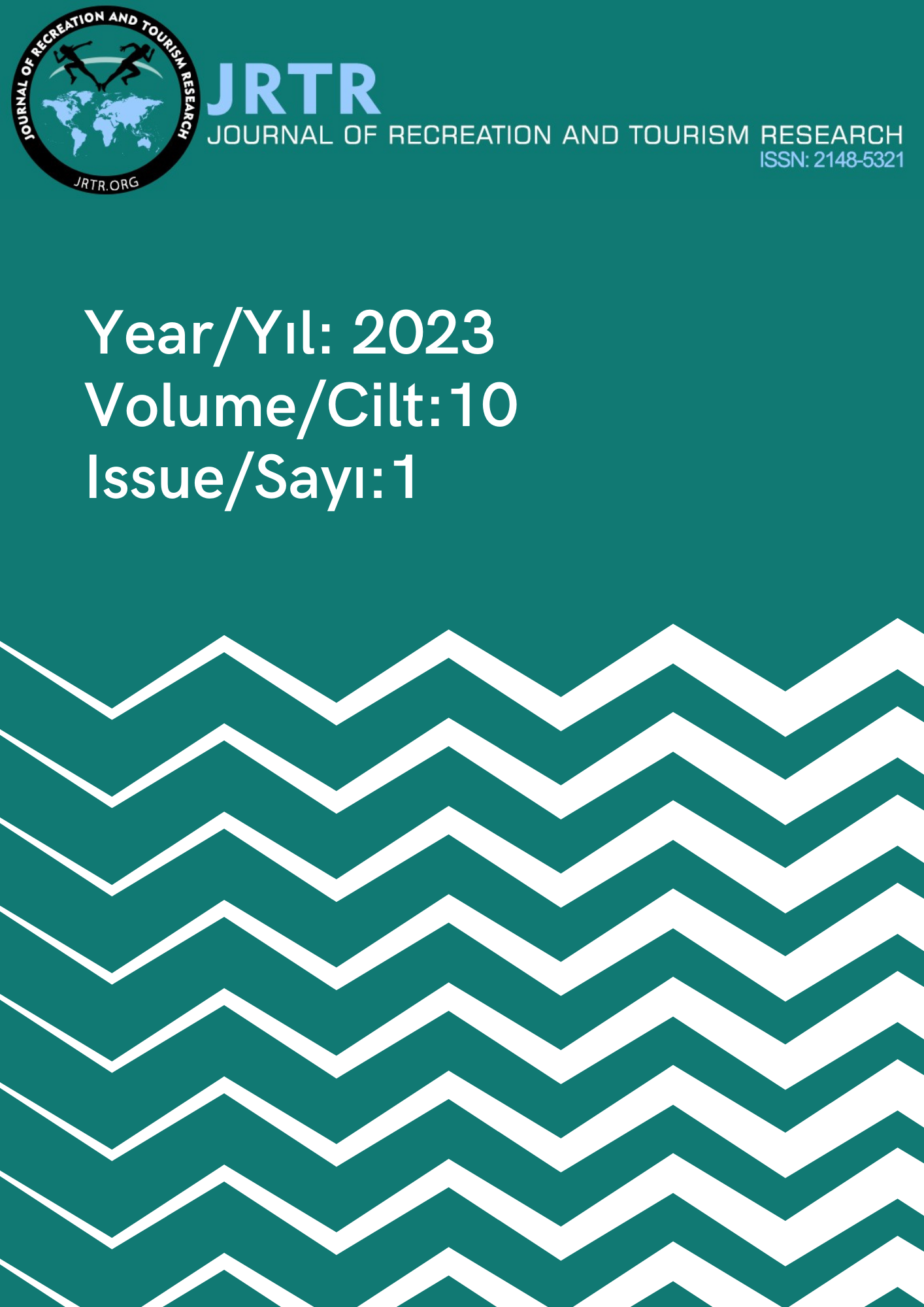A Bibliometric Analysis on Slow Food With VOSviewer
DOI:
https://doi.org/10.5281/zenodo.7783439Keywords:
Slow Food, Bibliometric Analysis, Rural Tourism, SustainabilityAbstract
Slow Food is a movement adopted by many people around the world. It originated in Italy and is a subject that is frequently discussed by academics today. This research presents a bibliometric analysis of 448 publications related to the Slow Food movement, published between 1998 and 2022 in the Web of Science database. The analysis used VOSviewer, a visualization software tool for bibliometric networks, to classify the publications according to their years and types, and to create a scientific map of institutional addresses of the authors. The study shows that the Slow Food movement has gained increasing attention in academic literature over the past three decades. The most frequently used keywords associated with the Slow Food movement, the most active countries and academic institutions in Slow Food publications are identified. Universities in Italy, the United States, and the United Kingdom are among the most productive institutions in the field of Slow Food research. The research demonstrates the growing interest in the Slow Food movement among academics and researchers and highlights the diversity of issues and perspectives related to this field. The findings can serve as a useful resource for academics and policymakers interested in Slow Food.
Downloads
References
Alkon, A. H., & Mares, T. M. (2012). Food sovereignty in US food movements: Radical visions and neoliberal constraints. Agriculture and Human Values, 29(3), 347-359.
Bornmann, L., & Leydesdorff, L. (2014). Scientometrics in a changing research landscape. Springer.
Boyack, K. W., & Klavans, R. (2010). Co-citation analysis, bibliographic coupling, and direct citation: Which citation approach represents the research front most accurately? Journal of the American Society for Information Science and Technology, 61(12), 2389-2404.
Chen, C., Dubin, R., & Kim, M. C. (2014). Emerging trends and new developments in regenerative medicine: a scientometric update (2000–2014). Expert opinion on biological therapy, 14(9), 1295-1317.
DuPuis, M. E., & Goodman, D. (2005). Should we go “home” to eat?: toward a reflexive politics of localism. Journal of Rural Studies, 21(3), 359-371.
Egghe, L. (2005). Power laws in the information production process: Lotkaian informetrics. Elsevier.
Fronza, I., Janes, A., Sillitti, A., Succi, G., & Trebeschi, S. (2013, May). Cooperation wordle using pre-attentive processing techniques. In 2013 6th International Workshop on Cooperative and Human Aspects of Software Engineering (CHASE) (pp. 57-64). IEEE.
Galli, F. (2019). Slow Food in the United States: A Movement that is Changing the Way We Eat. Palgrave Macmillan.
Glänzel, W., & Schubert, A. (2003). A new classification scheme of science fields and subfields designed for scientometric evaluation purposes. Scientometrics, 56(3), 357-367.
Hirsch, J. E. (2005). An index to quantify an individual's scientific research output. Proceedings of the National Academy of Sciences, 102(46), 16569-16572.
Kırıcı Tekeli, E., Bozkurt, İ., & Tabak, G. (2021). Turizm ve kadın olgusu: Web of Science veri tabanına dayalı bibliyometrik bir analiz.
Kloppenburg, J. (2018). The First Law of Food: A Sensible Approach to Sustainable Food Systems. Yale University Press.
Larivière, V., Gingras, Y., & Archambault, É. (2015). The decline in the concentration of citations, 1900-2007. Journal of the Association for Information Science and Technology, 66(4), 858-862.
Leydesdorff, L., & Rafols, I. (2011). Indicators of the interdisciplinarity of journals: Diversity, centrality, and citations. Journal of Informetrics, 5(1), 87-100.
Li, X., Wu, P., Shen, G. Q., Wang, X., & Teng, Y. (2017). Mapping the knowledge domains of Building Information Modeling (BIM): A bibliometric approach. Automation in Construction, 84, 195-206.
Lyons, K., & Mutersbaugh, T. (2010). Building alternative agri-food networks: Certification, embeddedness and agri-environmental governance. Journal of Rural Studies, 26(3), 209-219.
Nestle, M. (2002). Food politics: How the food industry influences nutrition and health. University of California Press.
Pascucci, S., & Santini, C. (2019). Slow Food: A global movement for sustainable food systems. In S. Pascucci & C. Santini (Eds.), Building a Resilient and Sustainable Agriculture in Sub-Saharan Africa (pp. 113-126). Springer.
Petrini, C. (2003). Slow food: The case for taste. Columbia University Press.
Petrini, C. (2010a). “Broad” consent, exceptions to consent and the question of using biological samples for research purposes different from the initial collection purpose. Social science & medicine, 70(2), 217-220.
Petrini, C. (2010b). Theoretical models and operational frameworks in public health ethics. International journal of environmental research and public health, 7(1), 189-202.
Petrini, C. (2013). Slow food nation: Why our food should be good, clean, and fair. Rizzoli Publications.
Petrini, C., & Gainotti, S. (2008). A personalist approach to public-health ethics. Bulletin of the World Health Organization, 86(8), 624-629.
Reisch, L. A., & Scholz, R. W. (2018). Sustainable food consumption: An overview of contemporary issues and policies. In Handbook of Sustainability Science and Research (pp. 683-701). Springer.
Ricciardi, L. A., & Largo-Wight, E. (2020). Slow Food, Slow Living, and Well-Being: Exploring Their Relationships. Frontiers in Psychology, 11, 1410. doi: 10.3389/fpsyg.2020.01410
Stephan P, Veugelers R, Wang J. Reviewers are blinkered by bibliometrics. Nature 2017; 544:411-2.
Ustaoğlu, E. T. (2019). İnsan robot etkileşimi konusunu kelime bulutu analizi ile kavramsallaştırma. Econder International Academic Journal, 3(2), 221-239.
Van Eck, N. J., & Waltman, L. (2010). Software survey: VOSviewer, a computer program for bibliometric mapping. Scientometrics, 84(2), 523-538.
Wallin, J. A. (2005). Bibliometric methods: Pitfalls and possibilities. Basic & Clinical Pharmacology & Toxicology, 97(5), 261-275.
Waltman, L., & Van Eck, N. J. (2012). The inconsistency of the h-index. Journal of the American Society for Information Science and Technology, 63(2), 406-415.
Williams, W., Parkes, E. L., & Davies, P. (2013). Wordle: A method for analysing MBA student induction experience. The International Journal of Management Education, 11(1), 44-53.
Yu, Y., Li, Y., Zhang, Z., Gu, Z., Zhong, H., Zha, Q., & Chen, E. (2020). A bibliometric analysis using VOSviewer of publications on COVID-19. Annals of translational medicine, 8(13).
Downloads
Published
How to Cite
Issue
Section
License
Copyright (c) 2023 Journal of Recreation and Tourism Research

This work is licensed under a Creative Commons Attribution-NonCommercial 4.0 International License.






